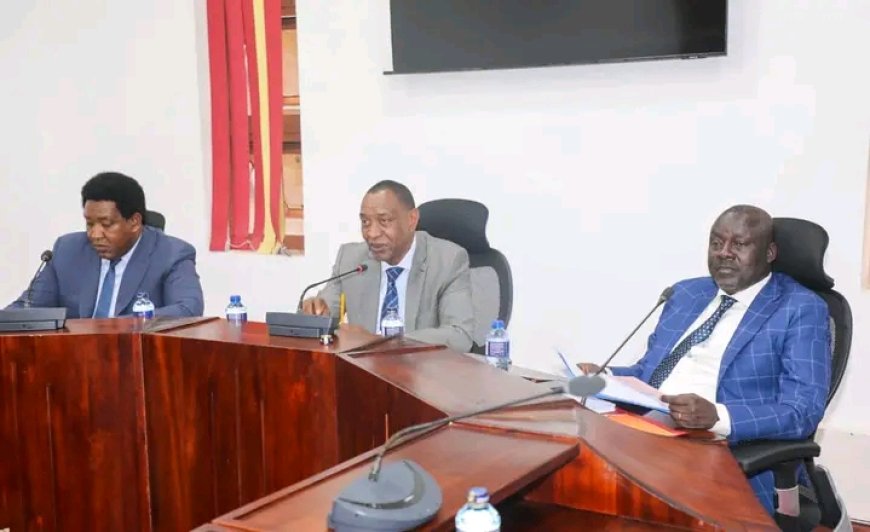Give Manufacturers incentives to Work at Night, Says KAM

Nairobi
Thursday, 24 October, 2024
McCreadie Andias
The Kenya Association of Manufacturers has pleaded with thr government to allow firms to work at night as an incentive to boost production.
Speaking today during a Senate Committee on Energy chaired by Nyeri Senator Wahome Wamatinga, The acting Chief Executive of the Association, Mr. Tobias Alando said that manufacturers consume up 67% of the electricity produced in the country with large commercial and industrial consumers being the major users of electrical energy.
In response to a question by Narok Senator Ledama Ole Kina on why Kenya Power Company loses 23.4 % of power produced
Mr. Alando said that 10% were technical losses as a result of transmission of power. This 10% is covered in tariff structure, but 13.4% loss are commercial whereby customers are metered, but they don't pay the bills or the clients are connected to the electricity grid but they are not billed due to lack of meters.
KAM said that 800 gigawatt hour per year geothermal energy is lost due to not being evacuated to various load centres.
800 gigawatts hours is appropriately 71% of what was purchased from petro-thermal generators during the period 2023-2024 at 1127 GWh, meaning that the uptake from expensive petro-thermal is unnecessarily higher while geothermal capacity is stranded.
The Association proposed to the committee that manufacturers should be given incentives to manufacture at night so that they can utilize the 800 GWh geothermal steam that is released to the air instead of being utilized by consumers
The meeting discussed the role of the manufacturing sector in energy space and the promotion of sustainable energy use in Kenya.
Meanwhile, The number of manufacturers that are turning to operating at night and benefiting from the discounted off-peak tariff surged 56.6 per cent last year, even as the government considers reviewing the tariff to relax the requirements to enable more firms to benefit from the tariff.
The number of companies that are now benefitting from the Time of Use (TOU) tariff increased to 2,241 by the end of the year to June 2024 up from 1,431 the previous year, according to data by the Energy and Petroleum Regulatory Authority (Epra).
The increase was largely due to the opening up the tariff to small and mid-sized manufacturers in April last year.
The companies operating under the tariff saved Sh1.84 billion over the year, a 28.6 per cent increase from Sh1.43 billion saved over the year to June 2023.
The tariff, which was aimed at spurring electricity consumption at night when consumption dips significantly and leaves power infrastructure idle, offers manufacturers a discount of up to 50 per cent on power consumed between 10pm and 6am as well as weekends and public holidays.
To benefit, however, firms had to meet stringent conditions, including exceeding their six-month average consumption.
In a recent meeting with KAM, Epra director general Daniel Kiptoo said the authority plans to finalise the review of the tariff to enhance adoption and utilisation.
Kiptoo added that there will be considerations to ensure that industries still have certain thresholds to meet so as to avoid a scenario where they migrate their operations to off-peak hours. This will shield Kenya Power from a drastic fall in revenues.
“In doing this, we are careful to ensure that we do not leave the utility out of pocket and they are able to meet their revenue requirements,” he said.
Industries, both large and small, account for the bulk of power consumed in the country.
The TOU tariff was introduced in December 2017. It was aimed at lifting manufacturing in the country but also increasing consumption at night, when demand significantly falls when industries and households shut down.
Power consumption patterns in the country are such that during the peak hours of between 6pm and 10pm, the power generation sources struggle to meet demand that peaks at about 2,132MW.
This falls significantly to 1,100MW deep into the night, which are the hours that the tariff aims at spurring demand.
The requirement that industries must surpass their monthly consumption to benefit from the tariff was also expected to lift Kenya Power’s earnings.
Industrial and commercial power users get a discount of as much as 50 per cent when they use power during the off-peak hours of between 10pm and 6am and in meeting certain thresholds.
On Saturdays, the off-peak hours are from midnight to 8am and again from 2pm to midnight and then the whole day on Sundays and public holidays.
Over a given month, power consumers only benefit if their consumption is over and above their average consumption over the last six months.
The firms also consume much of their power during the night, when the fleets of electric vehicles, many of them PSVs, are not working.
What's Your Reaction?



































































































































































































































































































